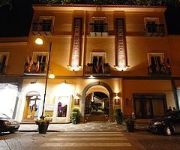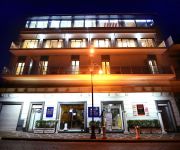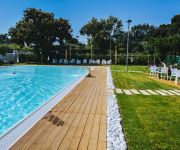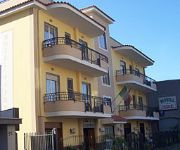Safety Score: 3,0 of 5.0 based on data from 9 authorites. Meaning we advice caution when travelling to Italy.
Travel warnings are updated daily. Source: Travel Warning Italy. Last Update: 2024-08-13 08:21:03
Touring Chiesa della Giuliana
Chiesa della Giuliana in Province of Naples (Campania) with it's 261 residents is a town located in Italy about 129 mi (or 207 km) south-east of Rome, the country's capital place.
Time in Chiesa della Giuliana is now 02:27 AM (Friday). The local timezone is named Europe / Rome with an UTC offset of one hour. We know of 10 airports nearby Chiesa della Giuliana, of which 5 are larger airports. The closest airport in Italy is Nápoli / Capodichino International Airport in a distance of 13 mi (or 21 km), North-West. Besides the airports, there are other travel options available (check left side).
There are several Unesco world heritage sites nearby. The closest heritage site in Italy is Archaeological Areas of Pompei, Herculaneum and Torre Annunziata in a distance of 1 mi (or 1 km), South. We collected 10 points of interest near this location. Need some hints on where to stay? We compiled a list of available hotels close to the map centre further down the page.
Being here already, you might want to pay a visit to some of the following locations: Boscoreale, Pompei, Boscotrecase, Torre Annunziata and Trecase. To further explore this place, just scroll down and browse the available info.
Local weather forecast
Todays Local Weather Conditions & Forecast: 14°C / 58 °F
| Morning Temperature | 11°C / 51 °F |
| Evening Temperature | 15°C / 59 °F |
| Night Temperature | 13°C / 55 °F |
| Chance of rainfall | 0% |
| Air Humidity | 48% |
| Air Pressure | 1019 hPa |
| Wind Speed | Gentle Breeze with 6 km/h (4 mph) from South-West |
| Cloud Conditions | Clear sky, covering 9% of sky |
| General Conditions | Sky is clear |
Saturday, 16th of November 2024
16°C (60 °F)
14°C (57 °F)
Sky is clear, light breeze, clear sky.
Sunday, 17th of November 2024
16°C (61 °F)
16°C (61 °F)
Sky is clear, light breeze, clear sky.
Monday, 18th of November 2024
18°C (64 °F)
16°C (62 °F)
Light rain, gentle breeze, scattered clouds.
Hotels and Places to Stay
Forum
Il Castello
Del Sole
Bosco de' Medici Resort
Hotel Vittoria
Hotel Grillo Verde
Iside
Santa Caterina Hotel
Hotel Mec
Hotel degli Amici
Videos from this area
These are videos related to the place based on their proximity to this place.
VEDUTA COSTA TORRE ANNUNZIATA-CASTELLAMMARE-POMPEI DA TEMPIO DI VENERE SCAVI
Veduta panoramica della costa tra Torre Annunziata e Castellammare di Stabia con scorci di Pompei ovest dal Tempio di Venere degli Scavi di Pompei. La concentrazione di attività ed abitazioni...
Pompeii Pompei Pompey City Ruins
A catastrophic eruption of Mount Vesuvius over two days left this wonderful ancient city completely buried in AD 79 at the height of the Roman Empire. Pompeii is still partially buried although...
Rome to Pompeii day trip
Rome to Pompeii day trip - In this video our day trip from Rome to Pompeii is shown. It's a fully guided tour which started in Rome from Piazza del Populo as the pickup place. And at 7:30 we...
Pompeii
Recorded April 12, 2013 The city of Pompeii was an ancient Roman town-city near modern Naples in the Italian region of Campania, in the territory of the comune of Pompei. Pompeii along with...
Italy travel: Pompeii arrival
http://ourvideosite.com/View/V355 Italy travel: Pompeii. Our Perillo Tours Familia arrives at one of the best preserved archaeological sites on the planet. S...
A day in Pompeii
SEE MY TRAVEL WEBPAGES: http://www.motorhomefulltime.com/ https://www.facebook.com/motorhomefulltime A day in Pompeii in a video essay with my descriptions of how the city was destroyed as ...
Pompeii, Italy - tour of the town destroyed by Mount Vesuvius
Pompeii - tour of the town destroyed by Mount Vesuvius in 79AD and remained lost until the mod 1700s when it was rediscovered by accident. It is now excavated and you can tour the ruins and...
Pompeii, Italy / Pompeje, Włochy
The city of Pompeii is a partially buried Roman town-city near modern Naples in the Italian region of Campania, in the territory of the comune of Pompei. Along with Herculaneum, Pompeii was...
POMPEI
The city of Pompei was an ancient Roman town-city near modern Naples in Italy. Pompei was mostly destroyed and buried under 4 to 6 mt (13 to 20 ft) of ash and pumice in the eruption of...
Pompeii Tour Guide best sites
Official tour guides Pompeii...Excursions of Pompeii...Visits and Private Tours of Pompeii...Pompeii Sightseeing...Pompeii daily trips...Discovering Pompeii...Professional guides of the archeologic...
Videos provided by Youtube are under the copyright of their owners.
Attractions and noteworthy things
Distances are based on the centre of the city/town and sightseeing location. This list contains brief abstracts about monuments, holiday activities, national parcs, museums, organisations and more from the area as well as interesting facts about the region itself. Where available, you'll find the corresponding homepage. Otherwise the related wikipedia article.
House of the Vettii
In Pompeii one of the most famous of the luxurious residences is the so-called House of the Vettii, preserved like the rest of the Roman city by the eruption of Vesuvius in 79 AD. The house is named for its owners, two successful freedmen: Aulus Vettius Conviva, an Augustalis, and Aulus Vettius Restitutus. Its careful excavation has preserved almost all of the wall frescos, which were completed following the earthquake of 62 AD, in the manner art historians term the "Pompeiian Fourth Style."
Villa of the Mysteries
The Villa of the Mysteries or Villa dei Misteri is a well preserved ruin of a Roman Villa which lies some 400 metres northwest of Pompeii, southern Italy.
House of the Faun
The House of the Faun (Italian: Casa del Fauno), built during the 2nd century BC, was one of the largest, and most impressive private residences in Pompeii, Italy, and housed many great pieces of art. It is one of the most luxurious aristocratic houses from the Roman republic, and reflects this period better than most archaeological evidence found even in Rome itself.
Temple of Jupiter (Pompeii)
The Temple of Jupiter, Capitolium, or Temple of the Capitoline Triad was a temple in Sbeitla, modern day Tusina, at the north end of its forum. Initially dedicated to Jupiter alone, it was erected in the mid-2nd century BC at the same time as the temple of Apollo was being renovated - this was the era at which Roman influence over Pompeii increased and so Roman Jupiter superseded the Greek Apollo as the town's highest god.
House of the Tragic Poet
The House of the Tragic Poet (also called The Homeric House or The Iliadic House) is a typical 2nd century BC Roman house in Pompeii, Italy. The house, or villa, is famous for its elaborate mosaic floors and frescoes depicting scenes from Greek mythology. Discovered in November 1824 by the archaeologist Antonio Bonucci, the House of the Tragic Poet has interested scholars and writers for generations.
Villa Boscoreale
Villa Boscoreale is an ancient Roman villa located in the town of Boscoreale, about one and a half kilometers north of Pompeii, southeast of Vesuvius, in Campania, southern Italy. This area was a hunting reserve and also used agriculturally, specializing in wine and olive oil. Evidence in tablets and graffiti shows that the house was probably built in the 1st century (around 40-30) BC. The villa was largely destroyed and entirely buried by the eruption of Mount Vesuvius in AD 79.
Temple of Apollo (Pompeii)
The Temple of Apollo is a temple dedicated to the Greek and Roman god Apollo in the ancient Roman town of Pompeii, southern Italy. Facing the north side of the town' it is the town's most important religious building and has very ancient origins. The cult of Apollo, imported from Greece, was very widespread in Campania, and (from excavations in the temple's vicinity) is attested in Pompeii since the 6th century BC.
House of the surgeon
The House of the surgeon is the oldest and one of the most famous houses in Pompeii. Which is located in the Italian region of Campania. It is named after ancient surgical instruments that were found there. It was destroyed by the AD 79 eruption of Mount Vesuvius, and uncovered in 1770 by Frances La Vega, (Spain).
Pompeii
The city of Pompeii is a partially buried Roman town-city near modern Naples in the Italian region of Campania, in the territory of the comune of Pompei. Pompeii along with Herculaneum and many villas in the surrounding area, was partially destroyed and buried under 4 to 6 m (to ft) of ash and pumice in the eruption of Mount Vesuvius in AD 79.
Macellum of Pompeii
The Macellum of Pompeii was located on the Forum and as the provision market of Pompeii was one of the focal points of the ancient city. The building was constructed in several phases. When the earthquake of 62 CE destroyed large parts of Pompeii, the Macellum was also damaged. Archeological excavations in the modern era have revealed a building that had still not been fully repaired by the time of the eruption of 79 CE.
House of Sallust
The House of Sallust is a domus or elite residence in the ancient Roman city of Pompeii. The oldest parts of the house have been dated to the 4th century BC, but the main expansions were built in the 2nd century BC. The long history of this structure provides important evidence about the development of elite residences in Pompeii. The house is located on the east side of the Via Consolare.
House of the Centenary
The House of the Centenary (Italian Casa del Centenario, also known as the House of the Centenarian) was the house of a wealthy resident of Pompeii, preserved by the eruption of Mount Vesuvius in 79 AD. The house was discovered in 1879, and was given its modern name to mark the 18th centenary of the disaster. Built in the mid-2nd century BC, it is among the largest houses in the city, with private baths, a nymphaeum, a fish pond (piscina), and two atria.























